#wilhelm nestle
Explore tagged Tumblr posts
Text

«Séneca roza a veces ideas cristianas, razón por la cual se creyó en un tiempo que estuvo en relaciones con el cristianismo. Ya los antiguos cristianos falsificaron un supuesto epistolario entre Séneca y el apóstol San Pablo. Pero las analogías entre Séneca y el cristianismo son meras consecuencias de presupuestos análogos; así, por ejemplo, la actitud moral respecto del prójimo es una consecuencia de la idea de hermandad de los hombres, común a la escuela estoica y a la religión cristiana. Por lo demás, ni siquiera la convicción senequista de la inclinación del hombre al mal tiene nada que ver con la doctrina cristiana del pecado: por eso no necesita Séneca de ningún Salvador, ni una doctrina de la gracia y de la redención. Pues Séneca tiene la conciencia limpia. Seguramente habrá oído hablar del cristianismo, igual que Tácito y que Plinio el Joven. Pero San Agustín da testimonio de que, en todo caso, Séneca no ha citado nunca a los cristianos en sus escritos, así como de que despreciaba a los judíos y se lamentaba de la difusión de su religión.»
Wilhelm Nestle: Historia del espíritu griego. Editorial Ariel, pág.321. Barcelona, 1981
TGO
@bocadosdefilosofia
@dias-de-la-ira-1
#nestle#wilhelm nestle#historia del espíritu griego#estoicismo#cristianismo#séneca#san pablo#pablo de tarso#cosmopolitismo#hermandad entre los hombres#salvador#gracia#redención#mal#tácito#plinio el joven#san agustín#agustín de hipona#judíos#judaísmo#religión#cristianos#época antigua#filosofía greco-latina#filosofía latina#roma#teo gómez otero#la muerte de séneca#rubens#museo nacional del prado
19 notes
·
View notes
Text
Reintober
Day 4: Pumpkin
Gender Neutral Y/N
The crisp bite of autumn air nipped at your skin as you walked through the festival grounds, the scent of spiced apples and roasting chestnuts wrapping around you like a warm embrace. The small village square was alive with golden lanterns, flickering candles nestled inside carved pumpkins, and the sound of cheerful music floating beneath the chatter of festival-goers.
And right beside you—a walking inferno of heat and muscle—stood Reinhardt Wilhelm.
Even in the crowded marketplace, Reinhardt was impossible to miss. His sheer size and presence commanded attention, his silver beard catching the amber glow of the jack-o’-lanterns as he rumbled with laughter at something an old shopkeeper had said. He was in his element here—celebrating, indulging, and basking in the joy of the season.
And yet… his focus never strayed from you.
"Ah, liebling," he murmured, placing a massive, gloved hand at the small of your back, pressing just enough to remind you that he was there. "Is it not glorious? The food! The games! The crisp air! I feel like a young man again!"
You barely had time to respond before his gravelly voice dipped into something softer, something only for you.
"But tell me, meine Liebe…" His fingers curled, tracing slow, teasing circles against your back. "What is it that makes your heart race most tonight? The festival… or something else?"
Your breath caught. That tone—low, possessive, dangerous in its intent.
You turned your head slightly, looking up at him, only to find his piercing blue eyes locked onto yours. He wasn’t talking about the festival anymore.
The crowd swirled around you, unaware of the way his touch lingered, how his body heat seeped through your clothes like a promise.
His thumb skimmed your hip, a feather-light touch that sent heat curling through your core.
"Tell me, liebling." His voice was thick with amusement, but there was an edge to it now, something more than teasing—something possessive. His fingers pressed, lingering, waiting.
Daring.
"Shall I find out myself?"
A shiver ran down your spine, but before you could answer—before you could fall deeper into the deliberate torment of his hands—a shout from the crowd pulled you both back into the present.
The Pumpkin Lifting Contest.
Reinhardt's smirk was slow, dangerous.
"Ah… a test of strength! How fitting."
His touch didn’t linger, but the promise in his eyes did as he pulled away, striding toward the circle of gathered spectators.
The pumpkin in question was monstrous. Easily twice the size of the others, its deep orange skin gleamed under the festival lanterns, looking almost too heavy for any sane man to consider lifting.
But Reinhardt was no mere man.
And as he rolled his massive shoulders, flexed his fingers, and sent you a knowing glance from across the firelit square—you knew, without a doubt, that this was still part of the game.
He wasn’t just lifting that pumpkin to win.
He was doing it for you.
To remind you exactly who he was.
And exactly what he could do to you.
A boisterous cheer erupted from the gathered crowd as villagers placed their bets, laughing and nudging each other as competitors struggled to even budge the behemoth gourd. A stocky farmer had managed to roll it a few inches. Another man attempted to lift it but nearly tipped over in the process.
Then came Reinhardt.
You didn’t miss the way the energy shifted as soon as he stepped forward. Towering over everyone, broad and imposing, he exuded raw confidence—the kind that sent a thrill down your spine. He stretched, rolling his massive shoulders, the movement making the thick muscles in his arms flex beneath his rolled-up sleeves.
"Ach! A fine pumpkin indeed!" He grinned down at you, then winked as if he knew exactly where your mind was about to go.
Oh, he knew.
Then, with no hesitation, he crouched down, gripped the enormous gourd—and lifted.
Effortlessly.
The crowd gasped, then roared in approval as he hoisted it above his head, biceps bulging, forearms tightening as if the weight was nothing to him. His fingers dug into the thick rind, veins popping along his forearms, his thighs flexing with sheer power as he held it high for all to see.
The whole festival erupted with applause, but your own breath caught for a different reason.
The way he looked—his raw, effortless strength, the way his muscles strained just enough, his sheer size dwarfing everything around him—sent your thoughts into dangerously wicked places.
You swallowed hard. A different kind of heat bloomed beneath your skin.
And then his eyes found yours.
The moment stretched too long. He should have been basking in his victory, playing up the crowd—but no, his gaze was locked onto you, heavy, deliberate, and laced with something darkly knowing.
Slowly, Reinhardt lowered the pumpkin, setting it down with a satisfying thud. You looked away, suddenly feeling very small as he made his way back to you. But instead of pulling away, he stepped directly into your space.
The festival noise melted away.
His voice dropped, rough and teasing, the deep bass of it vibrating through your bones.
"I could hold you just as easily, liebling…"
His fingers skimmed your hip. Not a full touch, not yet—just enough to send heat curling through your veins.
"Would you like to test it?"
Your breath hitched. The weight of his words, the undeniable challenge in them, sent a shiver of anticipation through you.
His smirk widened. He knew. Oh, he knew.
Reinhardt, for all his bravado, took his time watching you.
Savoring you.
The playful glint in his blue eyes darkened with something heavier, something that made your thighs press together involuntarily. His smirk deepened at the movement, but before you could say anything—before you could catch your breath—he was already reaching for your hand.
"Come, meine Liebe," he rumbled, his warm palm engulfing yours. "There is still much to do! And much more for me to prove to you, ja?"
Oh, he was enjoying this.
The shift in his grip—from playful to possessive—was subtle, but you felt it. Felt the way his fingers curled around yours, firm yet easy, as if daring you to pull away.
You didn’t.
Instead, you let him lead you toward the next game, the crowd parting effortlessly for him. People greeted him, cheered his victory, but Reinhardt barely acknowledged them.
His attention was locked onto you.
The pumpkin carving table was already set up, a handful of villagers chipping away at their own designs, chatting over cups of mulled wine. The air was thick with the scent of cinnamon and burning wood from the nearby bonfire.
You reached for a carving knife, but Reinhardt beat you to it—grabbing the largest blade on the table with a devious smirk.
"A warrior must always choose his weapon wisely," he declared, holding up the knife with exaggerated reverence.
You rolled your eyes, suppressing a laugh. "It’s a pumpkin, Reinhardt. Not a battlefield."
His grin was all teeth. "Ah, but you see—precision is key in both war and art! Perhaps you should guide me, hmm?"
Before you could protest, he moved behind you.
Close. Too close.
Heat poured from his body, a furnace against your back as his massive arms caged you in. His hands, so much larger than yours, settled over yours—his chest pressing against you, his breath warm against your temple.
And just like that, the game was forgotten.
He wasn’t paying attention to the pumpkin.
He was paying attention to you.
His fingers tightened, adjusting the way you held the knife, but his touch lingered.
"So delicate," he mused, voice thick with something dangerous, slow, and teasing. His thumbs brushed over your wrists, then lower, skating along your forearms in a way that had nothing to do with carving.
"So small… so easy to handle."
Your grip on the knife faltered. The pumpkin was the last thing on your mind now.
And Reinhardt knew it.
He pressed closer, his body a solid, immovable wall against your back, his hands sliding lower—just grazing the hem of your sweater.
Your breath caught.
The blade in your hand wobbled.
His chuckle was sinful, deep and indulgent, the sound reverberating through your spine.
"Careful, meine Liebe," he purred, his lips hovering just beside your ear. "Wouldn’t want to make a mess."
You weren’t sure if he was talking about the pumpkin…
Or you.
And judging by the way his fingers curled, teasingly, against your bare skin—he knew exactly what he was doing.
Your pulse was still hammering in your throat by the time you somehow managed to finish carving the pumpkin—or at least, you had made an attempt to.
Because while you had been focused on keeping your hands steady, Reinhardt had been focused on you.
The heat of his body still lingered, phantom touches burned into your skin where his fingers had wandered. The teasing rasp of his voice still echoed in your ears, that low, indulgent growl playing on repeat in your mind.
"Wouldn’t want to make a mess."
He knew exactly what he was doing.
And worse? You wanted more.
The festival continued around you, but the warmth from before had changed. There was a tension beneath Reinhardt’s usual boisterous nature now—a heat, a hunger just barely restrained beneath the surface. You could feel it in the way he guided you through the stalls, in the way his hand never left you.
A palm at your back. A squeeze at your hip. A slow drag of fingers up your arm, as if he was memorizing the shape of you.
And when the two of you finally found yourselves near the bonfire, you finally found a moment of privacy. The crackling flames cast flickering shadows across his broad frame as Reinhardt turned to you with something wicked in his expression.
"Ah, liebling," he murmured, reaching into a basket of smaller pumpkins. He plucked one—round, warm, fitting easily in his massive hand—and offered it to you with a smirk that sent heat pooling low in your stomach.
"A gift for my greatest treasure."
You giggled, shaking your head. “A pumpkin, Reinhardt? You shouldn't have.”
His arm hooked around your waist before you could take a step back, pulling you flush against him. A sharp inhale left your lips, swallowed by the solid heat of his chest, the feeling of his strength coiling around you like a knight safeguarding his most precious prize.
And he was not subtle about it.
The festival was still in full swing. Anyone could see.
And he did not care.
"I wonder, meine kleine Kürbis…" His voice dipped, the cadence intimate, slow, sinful. The words brushed against your ear, warm and deliberate.
"Would they notice if I touched you here?"
The first graze of his fingers against the inside of your thigh was feather-light. Barely there. But deliberate.
Your breath hitched.
You felt his chuckle more than heard it—deep, satisfied, smug.
"So responsive."
His fingers stayed there, teasing, dangerous in their patience.
You were out in the open. The firelight flickered. Laughter, voices, music swirled around you.
And yet, the only thing you could focus on was the way his touch burned through your clothes, the way his body caged you in like he was daring you to challenge him.
Daring you to stop him.
But you didn’t.
And his smirk?
It said he knew exactly how this night was going to end.
The festival spins on without you, voices rising in laughter, the scent of autumn thick in the air. But for you, the world has narrowed down to a singular force—Reinhardt.
You can feel it before he even speaks. The shift in the air, the weight of his gaze burning into you, the way his fingers curl just a little tighter at your waist.
Then—his mouth ghosts your ear, his breath hot and wanting.
"Come with me."
His voice is husky, low, threaded with something dark and unshakable. A command. A plea. A promise.
You barely nod before he moves.
His grip is firm, possessive, guiding you through the maze of stalls with effortless certainty. You weave past carved pumpkins and forgotten cider mugs, the flickering lanterns casting shadows against his broad frame.
And then, suddenly—you are out of sight.
A sliver of darkness between wooden stalls, tucked just behind the festival but still close enough to hear it.
Close enough to be caught.
Your back meets the rough grain of a wooden post, the faint scent of hay and autumn spice wrapping around you. But the only thing you register is Reinhardt—towering, caging you in, eyes molten with want.
"Mine."
The word rumbles from him like thunder, low and absolute, vibrating through your bones.
He presses closer, chest solid and overwhelming, trapping you in place.
"Say it."
You barely have time to draw breath before his mouth crashes against yours—hungry, consuming.
It’s not a kiss. It’s a claiming.
Heat floods through you as he devours, lips parting, his beard scraping against your skin with every desperate, greedy movement. His hands are everywhere—skimming your waist, palming your hips, fingers digging in as if to mark you through your clothes.
The festival noise is still there—faint laughter, the distant strum of a fiddle—but it is meaningless.
All you hear is his breath, his growl, the muffled sounds he pulls from you with every touch.
His fingers dip beneath your sweater, dragging slow, teasing warmth against your skin.
You shudder.
Reinhardt grins.
"Ah, meine Liebe, you are trembling…" His voice is silk-wrapped sin, a mixture of pride and promise. His hands tighten, pulling you even closer.
His mouth trails lower, hot breath teasing against your jaw.
"But we have only just begun."
His eyes traced over you, slow and thoughtful, the way a craftsman studies his finest work before making the first cut.
"Do you know what I love about autumn, meine Liebe?" His voice was lower now, rougher, the sound vibrating through your chest.
You swallowed, trying to focus, trying not to let the way he leaned in—so close you could feel the heat rolling off him—scatter your thoughts completely.
"The patience."
A pause.
"The harvest is never rushed."
His fingers finally moved, slow and deliberate, ghosting over the curve of your waist, not quite settling, just teasing.
"The best things in life, liebling… take time."
Your breath hitched. His touch never lingered too long, never pressed too far, but that was the worst part. He was testing you, watching you, waiting for you to react—waiting to see how far he could push before you begged for more.
"Reinhardt." You whined, the sound came out more like a plea. Your breathing is heavy. The distant sound of the festival wrapped around you both, but it barely registered. Not when his fingers dipped lower, grazing fabric and skin alike, tracing slow, absent-minded circles.
"So warm," he murmured, almost to himself.
Your hands gripped the stall behind you, fingers curling against the rough wood as you bit your lip, fighting the sound threatening to escape.
Reinhardt saw. He weaved a hand up your shirt, finding a nipple but, to your frustration, gliding over it with the ghost of a touch. You whine.
And oh, he liked that.
"Do you think anyone would notice, meine kleine Kürbis?"
The words sent a sharp jolt of heat through you—not just from their meaning, but from the way he said them.
Like he was already imagining it.
Like he wanted you to imagine it too.
His breath skimmed the side of your face, his fingers still resting on the edge of something dangerous, still not moving any lower, still not touching the places that needed to be touched, though you could feel the restrained strength beneath his grip.
"Not yet," he hummed, amused by your anticipation.
And just like that—he pulled away.
The absence of his warmth, his touch, was almost unbearable.
He knew it too.
Because when he finally stepped back, letting air rush between you, his smirk was entirely too pleased.
"Patience, liebling," he said, adjusting his coat like he hadn’t just unraveled you with a few whispered words. "The best things are worth waiting for."
Then, with one last glance, one last knowing touch to your wrist, he walked back toward the bonfire—leaving you breathless, flushed, and wanting.
Your heart was still racing, your skin still buzzing where he had touched you. And as you watched Reinhardt disappear back into the firelight—broad, smug, utterly in control—you realized something dangerous.
You had never wanted him more.
12 notes
·
View notes
Note
Why did I think about Running with Wolves with the shot of Edmar in the spotlight in some alleyway or something in the new ad? Idk, just them being spotted doing something they "shouldn't", when they eventually become more than detective/criminal. I might just be loving your fic too much and going crazy 🫣
anon, you are not the first person to message me about this. and. yes. it's very much giving Wolves Wilmon hidden meeting in a back alleyway 😈😈😈 what are they up toooooo

but also tysm the fact that you thought of MY silly little fic is so 😭😭😭 ily and i promise ch4 is coming very sooooooon
this is technically from ch5 but i recently rewrote this scene, so if you've been here since... jfc since last September. well. it is now nestled nicely into some context and somehow even more horny :)
Wilhelm snapped the folder shut and dropped it on the desk behind him. “What do you want?"
Two steps, and Wilhelm was in his face again. Simon stepped back, opened his mouth to respond but— “Surely you must want something,” Wilhelm said tauntingly, bent over Simon, staring down at him with those knowing eyes. “I don’t—” “Come on,” he purred. “What do you want? It was rather dangerous—fucking reckless—of you to follow me there…” Just like that first time, Wilhelm had Simon backed into the wall before he even realized what was happening. Simon shifted against the wood, keeping his head tilted up defiantly, even if his increasing breath might give him away. “What did I say about following me around, little lamb?” Wilhelm grinned, head tilted like a predator.
11 notes
·
View notes
Text


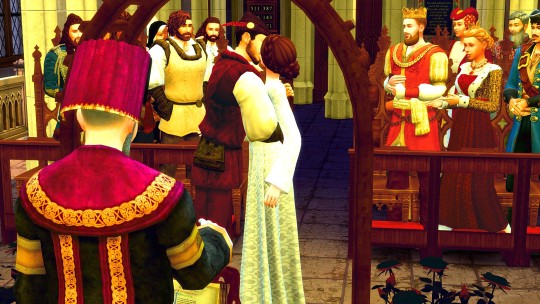
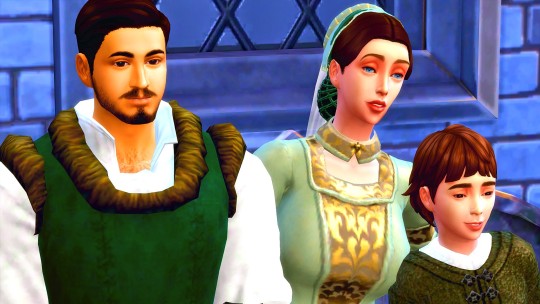


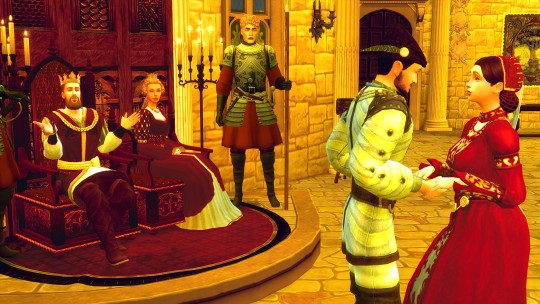

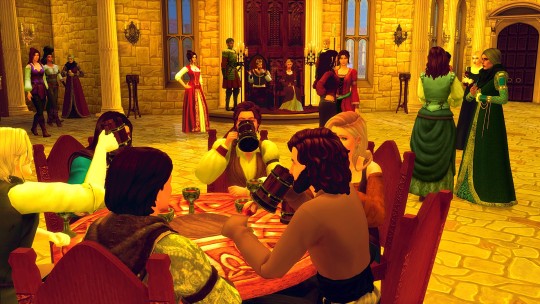
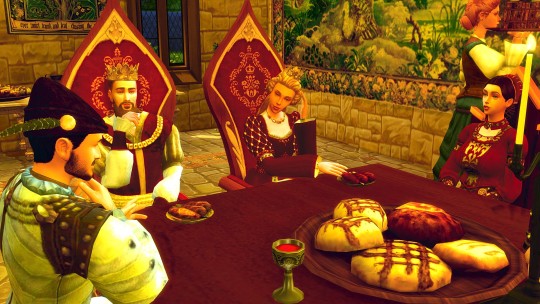



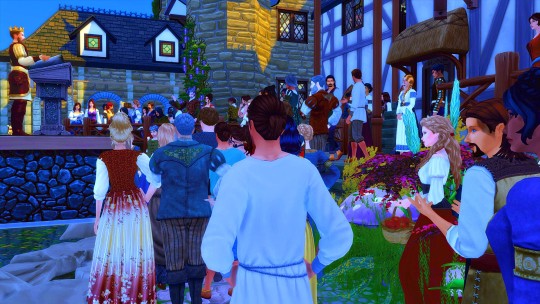

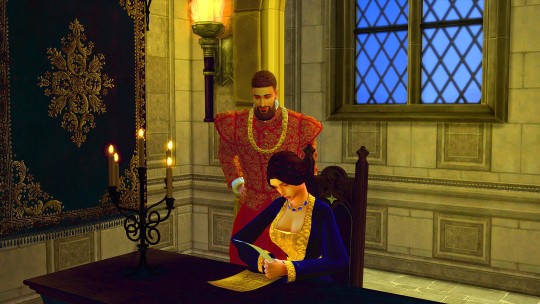
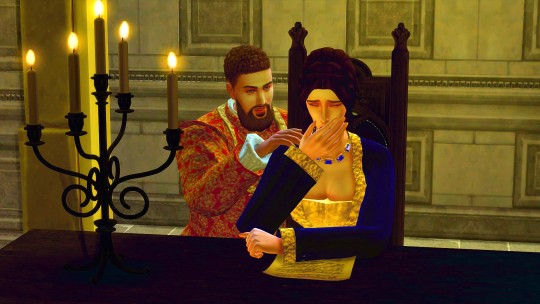

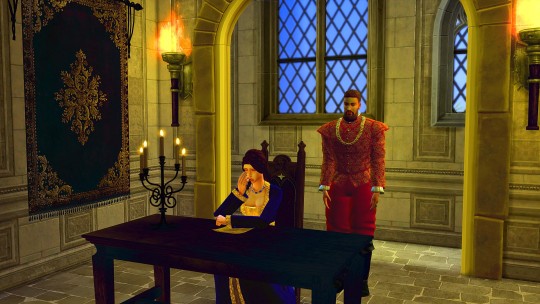




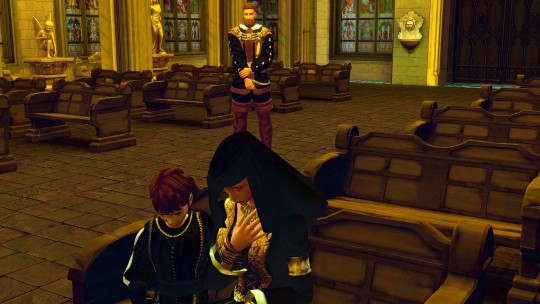
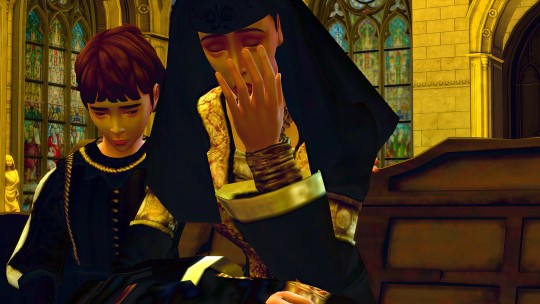



In the summer of 1339, as the rain's gentle touch graced the serene realm of Aarbyville, St. Anthony's Cathedral emerged as a solemn stage for a poignant ceremony. Lady Jane Landgraab, clad in somber mourning attire, her countenance veiled by the shroud of grief, stood beside her 7-year-old son, Lorus. Their hearts weighed heavy, for before them lay the dark stone coffin of Lord Michael Landgraab, who had passed away unexpectedly in his slumber at a mere 40 years of age.
Lady Jane and Lorus, their shared loss etched in their eyes, gazed upon the final resting place of their beloved. Their expressions conveyed profound sorrow, and an aura of disbelief clung to them like a shroud. As the cathedral bells tolled in mournful unison, mother and son leaned upon each other for silent solace, their tears the only words their hearts could speak.
Their shared grief brought them to the tranquil chapel nestled within the cathedral's embrace. Here, silence reigned, providing a sanctuary for their emotions to flow freely. Together, they wept, finding consolation in their shared sorrow, a flicker of light in their darkest hour.
Into this poignant scene stepped Lady Jane's brother, the formidable King Wilhelm of Windenburg. He had come to pay his respects to his brother-in-law and to offer what comfort he could to his grieving sister.
With a heart heavy with sorrow, King Wilhelm approached Lady Jane. His eyes mirrored the shared grief that weighed upon their family. With great tenderness, he expressed his deepest condolences, using words of sympathy and support to alleviate the crushing burden that had fallen upon Lady Jane's shoulders.
Yet Lady Jane's distress ran deeper than mere grief; she was overwhelmed. The responsibilities of her newly acquired title as Lady of Aarbyville had proven to be a burden too great. Lord Michael's sudden and untimely passing had left her in a state of disarray. The prospect of shouldering the governance of the realm, especially with a 7-year-old Lorus in tow, was something she could hardly bear. She felt lost in this unfamiliar role.
Understanding the depths of his sister's despair, King Wilhelm knelt beside young Lorus, his promise to be their unwavering pillar of strength resonating with sincerity. With this pledge of support, Lady Jane glimpsed a glimmer of hope through her tears and embraced her brother in a somber, heartfelt hug.
In the weeks that followed, King Wilhelm became a familiar presence at Castle Landgraab in Aarbyville, the stately home that had graced the Landgraab family since the days of King Otto III of Tredony. Within the confines of her late husband's office, amidst the faint scent of history and the volumes of leather-bound tomes, Lady Jane's inner turmoil became evident. The weight of responsibility bore down upon her, and she struggled to cope with the immense demands of leadership.
Recognizing her predicament, King Wilhelm stood by her side, both as a brother and a ruler. With a heavy heart, he assisted Lady Jane in drafting a decree, one that would relinquish her power and place the realm of Aarbyville under Windenburg's dominion. The decree proposed that Aarbyville would henceforth become a duchy within the expansive realm of Windenburg. It further stipulated that when young Lorus reached the age of 18, he would ascend to the position of Duke, inheriting Castle Landgraab and its responsibilities.
For Lady Jane, this decision was a momentous one. She knew that her signature upon that document would irrevocably alter the course of her life and that of her son. The potential risks and uncertainties weighed heavily on her mind. King Wilhelm, always the supportive brother, placed a reassuring hand upon her shoulder, assuring her that brighter days lay ahead.
King Wilhelm was acutely aware of the strategic importance of this decision. The annexation of Aarbyville was not just about expanding his vast empire; it was also about securing trade routes and a wealth of resources. Aarbyville was strategically located, and seizing power from this region could help King Wilhelm strengthen his political alliances across the globe. This decision had far-reaching implications, and King Wilhelm was resolute in his belief that it was the right path for his kingdom. Aarbyville was once an integral part of the vast Tredonian realm, had remained steadfastly loyal to its Tredonian heritage since the days of King Otto III in the 12th century. When the mighty Tredonian empire fell to Bagley's rule in 1314, Aarbyville chose a different path, emerging as a sovereign state, proudly maintaining its Tredonian roots. Situated along the picturesque coastline, just a few miles from Windenburg's borders, Aarbyville had embraced its unique status. In the wake of the Tredonian empire's decline, this thriving city had evolved into a beacon of commerce and trade, fostering diplomatic relationships with neighboring kingdoms.
In the days that followed, King Wilhelm stood before the people of Aarbyville in the main town square. As he addressed a sea of expectant faces, some filled with trepidation, he outlined the transition into Windenburg's fold. He explained the laws and changes that would come into effect and assured the people that their basic needs, from meat to grain and wine, would be met. With words of hope and prosperity, he promised to rule justly and benevolently.
As the sun dipped below the horizon, King Wilhelm and Queen Cordelia hosted a magnificent banquet at Windenburg Castle. The grand dining room was filled with nobles, royals, and dignitaries from across the realm. The banquet was a celebration of new beginnings, prosperity, and a unified realm.
The tables were laden with a sumptuous feast. A boar's head, fresh-baked bread, a medley of cheeses, an array of succulent meats, and a lavish selection of desserts graced the banquet. It was a celebration that marked not only the integration of Aarbyville but also the dawn of a strengthened realm.
During the banquet, King Wilhelm, ever the astute strategist, observed his favored courtier, Benedict Britechester, gazing intently across the table at Lady Jane. This sight sparked a shrewd idea in the king's mind, one that could benefit not only his kingdom but also Lady Jane's future.
Following the banquet, the celebration continued within the royal court. King Wilhelm and Queen Cordelia presided from their opulent thrones, overseeing the festivities. King Wilhelm then called forth Lord Benedict and Lady Jane to ascend to the dias before the monarchs.
With a voice that resonated throughout the hall, King Wilhelm proposed the betrothal of Benedict and Lady Jane, a union of great honor and strategic importance. It would bind the Britechester bloodline with the royal family of Windenburg for generations to come and Marrying Lady Jane to Lord Benedict would also ensure the Landgraab family's continued loyalty to the crown through her son. This marriage would serve as a binding agreement, solidifying King Wilhelm's control over Aarbyville.
Overwhelmed by this great honor, Benedict took Lady Jane's hands in his. Their eyes locked in a moment of mutual understanding, recognizing that this union was more than politics; it was a connection of two souls.
In the following weeks, as they courted and drew closer, their bond transcended the realms of politics and power. Love blossomed between Lady Jane and Lord Benedict. They found solace and strength in each other, two souls who had weathered the storms of life together.
Lord Benedict not only secured a place in Lady Jane's heart but also embraced a parental role in young Lorus's life. His care and kindness did not go unnoticed by the mourning child. Lorus came to see him not as a stranger but as a guardian and a friend.
By the early fall of 1339, Lady Jane and Lord Benedict were wed at the renowned Westsimster Abbey in a grand and splendid ceremony. It was a union born of politics but solidified by love. As they exchanged their vows, their smiles spoke of the profound connection they had formed.
Following the wedding, King Wilhelm granted the new couple a generous gift. Since his own wedding three years prior, he and Queen Cordelia had worked tirelessly to expand the land that had been gifted to them by King Thomas, Cordelia's father. This area had been transformed into a thriving town with abundant farms and resources. King Wilhelm's gift to the newlyweds was that he had named the realm the duchy of Britechester and appointed Benedict as Duke. The couple came to the throne room at Windenburg Castle, where Wilhelm publicly bestowed upon them the titles of Duke and Duchess of Britechester.
By the spring of 1340, the couple eagerly anticipated the arrival of their first child. It was a testament to the enduring power of love amidst the backdrop of political strategy and destiny. The realm of Windenburg, now further strengthened by the bonds of family and alliance, stood poised for a bright and prosperous future.
#simsmedieval#sims4#windenburg#royalsims#royal#sims#thesimsmedieval#gameofthrones#royalty#simsstory#simmer#historical sims#royalty sims#sim legacy#sims 4#simblr#sims 4 gameplay#sims 4 cc#sims 4 screenshots#my sims#sims 4 edit#14th century#historicalsims#history#historical#historic#world history#legacy challenge#ts4 legacy#sims 4 legacy
54 notes
·
View notes
Text
young royals fic rec, 13/?
i’m (slowly) working my way through the wilmon tag on ao3 and thought that as i go i might shout out some fics i enjoy along the way! i've tagged authors where i knew their tumblr url, but please feel free to tag folks or dm me if you know ones i've missed!
1. play my song by @ishotforthestars - Wille wishes he could sleep, would give just about anything to end the sleepless nights, escape the racing thoughts that have taken over his tired mind. By accident he stumbles upon a late night radio show one night and suddenly finds himself longing for the company of a boy he's never met.
2. too in love to die by adogwithabirdatyour_door - It isn’t an option for Wilhelm. Whether Simon chose to forgive him or not, Wille can’t be with him- not in the way he deserves, not in the way that Wille longs for. This part of Wilhelm will always have to be hidden, and he knows now he can’t force anyone to be his secret, to put up with this shit.
3. up for the challenge (orphaned fic) - Simon visits the palace for Christmas dinner with the queen, plus a more realistic take on a particular kind of 'first time'.
4. Following an Ominous Voice Into a Dark Alleyway Turned Out to be a Great Idea, Actually by @spaghett-onaplate - Simon Eriksson is upset while wandering through Bjärstad at night. He hears a voice coming from a dark alley and decides to follow it. Met with the absurdity of the prince of Sweden trying to lure a feral cat out of a drain with a pepperoni pizza and failing miserably, he soon forgets about his troubles.
5. weigh down on me (stay 'til morning) by @echo-and-dust - A new semester at Hillerska begins, and Wilhelm enjoys a peaceful morning with Simon in bed.
6. wille’s sweet blue (that is a color) bedsheets are something that can actually be so personal by @fishscalesky - “I really am sorry,” Wille murmured, turning his head slightly and speaking into Simon’s hair. A few seconds later, Simon felt him press a kiss there, nestled among his curls. Simon’s knees knocked against Wille’s legs as he shifted, gravel scraping under them. He didn’t want to open his eyes. “Sure.”
7. and i knew you'd come back to me by pocketsizedomar - what i imagine could be happening in that season 2 stills of simon and wille in the hallway, and that other picture we got of them hugging
47 notes
·
View notes
Note
I love the laura bonus ficlet! Do you maybe can write about her thoughts of when she found out that it was Wilhelm who was there with Simon in Bjärstad?
Thank you for loving Laura! (The previous Laura ficlet is here to give context)
Also for the reblogs, this is a bonus ficlet from my longer YR fic Everybody Loves You Now!
This picks up from slightly later in the conversation in the car between Simon and Laura.
Laura considers her next question for all of thirty seconds before going with her gut. “Is ‘Fuck this Motherfucker’ about Candace?”
Simme laughs. She made Simme laugh! There's a little buzz of pride in her stomach. “Is that what people think? You guys know I didn’t write it, right?”
“I know, but you said you always try to have a concept in mind when you sing, to make the songs about something.”
He gives a little nod, acknowledging her point. “True. I guess it’s about Candace a lot.” He shrugs. “But one time it was definitely about this stretch of highway we’d been on the night before that was so full of potholes -”
“Atlanta to Nashville,” she says, instinctively, like this is some Simme trivia game and not just her knowing a weird number of facts about his actual life. “Sorry. I just… I saw the video.”
She glances sideways at him again. He looks amused rather than mad, and he hasn’t refused to answer any of her questions yet so she kind of has to. “Can I ask… Who do you think about when you sing the love songs?”
“Wilhelm.”
There’s no hesitation to it. No equivocations, no questioning. Just the name, said so softly that it takes her a moment to connect it to the reality of Crown Prince Wilhelm who gives speeches on Year with the Royal Family and gets photographed in suits hugging babies and opening hospitals.
It’s a weird crossing of streams, realising The Crown Prince is a person and there are people he dated in high school who say his name like it’s something precious they want to keep hold of.
But like, that was four years ago. And Simme hasn’t even been back to Sweden since. “Still?” she finds herself asking.
“Yeah.” He’s looking out the window, at the shadows of trees in the darkness. “He’s the only… there’s never been anyone else.”
There have been four years of constant wall to wall news coverage of Simme with this popstar or that actor or this reality TV star. Simme laughing off his high school relationship with the Prince of Sweden like it was nothing at all. “I thought… I mean we all heard about Alfonso…”
He laughs something bitter lingering at the edges to it. “I thought it was a marketing stunt, he thought it was true love. We didn’t last.”
“But you and Wilhelm are still…”
“No,” he says. “We’re not.” His fingers drum against the door handle. “Can you pull over? Just for a minute. I need to do something.”
*
She’s at that point where she’s basically awake but is refusing to admit it, nestled down into the covers trying to avoid opening her eyes, half thinking that if she does everything that happened last night is going to turn out to be a wild dream and she’ll be back in Gothenburg about to wake up and drive to Stockholm to meet Stan and see the show.
Then there’s a gentle knock on the door and an unmistakable voice says, “Hey? Can I come in?” and Laura opens her eyes to a closet-sized bedroom with posters of horses on the walls.
She’d found a nightshirt to sleep in that falls all the way down to her knees, so she’s decent enough to sit up and say, “Okay?”
Simme steps into the room. He’s changed into a purple hoodie, but otherwise he looks much the same. Like he hasn’t slept or showered since he dug out a silk pillowcase from the depths of the linen cupboard. His eyes catch on the horse posters, lingering a moment too long before he looks down at her. “There’s lunch. If you’re hungry.”
She wants to ask ‘are you okay?’ but his eyes keep darting back to the walls, his hands are twitching and he had to pull over multiple times so he could snort a powder that she’s really hoping was not cocaine so she’s not sure she’s ready for the answer.
Also now he’s mentioned food, she’s realising she’s starving. “Sure.”
He nods, takes a step back so she can stand up and then leads her back down the tiny hallway, past family photos that she resists the urge to stop and peer at, and into the kitchen where there are two strangers setting the table and one of them is Crown Prince Wilhelm.
She lets out a noise that might be a yelp, starts a, “You’re-” but thankfully cuts herself off before she can say something completely idiotic like ‘you’re here’ or ‘you’re the prince’ or ‘you’re taller than you look on TV.’
It turns out there is a difference between knowing there is something going on between Simme and the Prince and actually seeing said prince in the flesh wearing Simme’s white hoodie instead of a neatly pressed suit and setting out plates on the kitchen table.
Only the hoodie was oversize on Simme but clearly fits Prince Wilhelm just fine so that’s… a thing.
“Hello,” she says, trying to get back to normal only this isn’t normal because he’s a prince so like. “I mean, your majesty.”
Prince Wilhelm smiles. Up close, it’s the same kind of smile Simme keeps giving her, the one he seems able to paste over whatever he’s really feeling in the moment. “Your majesty is my mother,” he says. “Call me Wilhelm.”
Which of course just reminds her of being in the car the night before, the way Simme’s voice softened on Wilhelm’s name. And Simme had said they weren’t still… but Wilhelm is here, in this middle-of-nowhere town. Not Simme’s team, not Candace, just Wilhelm.
A good half of the internet would pay a large fortune for a glimpse of what she's seeing now. The way Wilhelm's eyes track Simme's progress through the room, the way Simme's whole body seems angled towards the Prince even when they're not interacting at all.
"Have you told anyone you're here?" Wilhelm's bodyguard asks her.
She hasn't. And as Wilhelm and Simon both reach for a plate at the same time and flinch back a moment before their fingers brush, she knows she never will.
#elyn fic#commentary meme#bonus content meme#tw drugs mention#at one point I wanted to write a whole laura spin-off just about how wild it would be to be in the car with Your Blorbo for two hours#just imagine the awkward weirdness
39 notes
·
View notes
Text
instagram
Palace Charlottenhof, Potsdam, Brandenburg, Germany
✨ Charlottenhof: the empire jewel I long to return to ✨ 🌍 There are places on this Earth that call me back with an unshakable force. Charlottenhof in Potsdam is one of them. I visited in 2017, capturing moments that I have since shared on Instagram—fragments of a dream I long to revisit. This neoclassical jewel, nestled within Sanssouci Park, is more than a mere palace; it is an ode to design, a masterpiece of harmony between #architecture, craftsmanship, and royal vision. 👑 Commissioned by Crown Prince Frederick William of Prussia (later King Frederick William IV) as a summer retreat, Charlottenhof was transformed from a modest estate into a refined villa between 1826 and 1829. The genius behind its redesign? None other than Karl Friedrich Schinkel, Prussia’s architectural luminary, who infused the residence with his signature clarity and elegance. But Schinkel was not alone in this endeavour—his vision was brought to life by the master builders and artisans who shaped every #decor. 🎨 Among them, Christian Daniel Rauch’s sculptural contributions lent an air of classical serenity, while the legendary Peter Joseph Lenné orchestrated the surrounding gardens with mathematical precision and poetic grace. Inside, the interiors are a symphony of #design history, a collaboration between Schinkel and cabinetmaker Ferdinand Wilhelm Holbein, whose exquisite woodwork graces the villa with unparalleled refinement. The #art crafted for the space echoes the purity of antiquity yet pulses with the modernity of the early 19th century. 🏛️ Charlottenhof was used primarily between 1829 and the mid-19th century, serving as a private sanctuary for the artistic and philosophically inclined Frederick William IV. Walking through its halls, one feels the whispers of conversations between monarchs, architects, and visionaries—voices that shaped not only Prussian culture but #luxury aesthetics at large.
Some Glimpses from Germany for your Weekend :)
#Schloss Charlottenhof#Palace Charlottenhof#Potsdam#Brandenburg#Germany#Deutschland#Christian Daniel Rauch#Peter Joseph Lenné#Frederick William IV.#Preußen#Prussia#Instagram
2 notes
·
View notes
Text
this is related to the last post i reblogged but here's the residents of ivarstead from my fic if they were flowers:
Gwilin // Mexican marigold (Tagetes erecta)

Gwilin irradiates happiness, and what better shape to irradiate something could one possibly take than a sphere? The Nahuatl word for this flower literally means "twenty flowers", and what a fitting name that is, for this is actually an 'inflorescent' or 'composite' flower, made up of many tiny little flowers arranged on the base of a single sepal.
Fari // Touch-me-not (Mimosa pudica)

Like Fari, the touch-me-not is bright, bold, and thorny, and it'll take over the world (and your backyard) if you let it. But it also has a soft side–this bad boy is one of the few plants that display nyctinastic movement, which just means that they respond very very quickly to touch! When disturbed, the touch-me-not's leaves fold and curl away for a few minutes and open up again when the coast is clear. Emotionally, that is 100% Fari.
Narfi // Moonflower (Ipomoea alba)
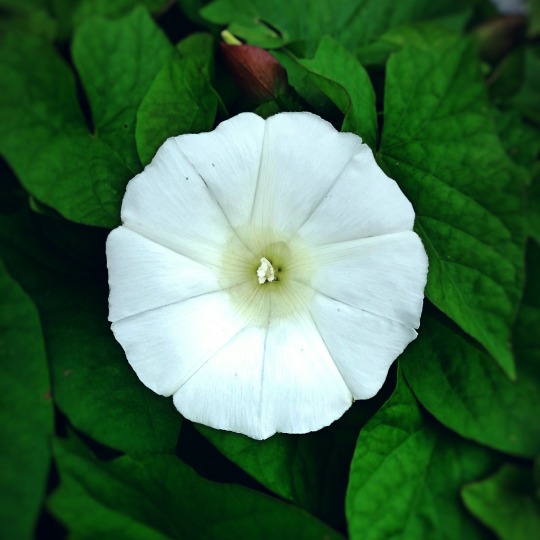
This one is sort of an inside reference. One of the commenters on my fic mentioned that they headcanon Narfi as being a werewolf. Seemed fitting to choose a flower that likes to open at night :)
Wilhelm // Gardenia (Gardenia jasminoides)

Wilhelm is a simple guy with simple needs. He's hearty, helpful–and perhaps a tad old-fashioned for some folks' tastes. But he's sweet, like this flower's unmistakable perfume, and he doesn't put on airs, and he's got a good heart. Easygoing flower for the easygoing innkeeper. Fun fact: the principal component responsible for giving this flower it's lovely scent is called farnesene, which is the same chemical associated with the smell of green apples.
Lynly // Purslane (Portulaca spp.)
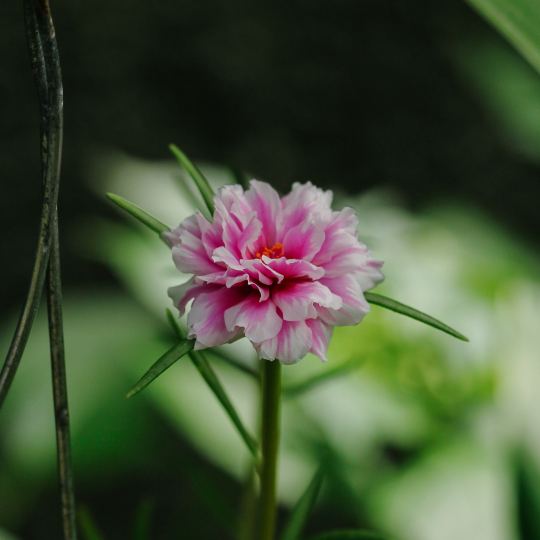
This flower has hopes and dreams. It just looks it. At some point in her life, Lynly wanted nothing more than to perform at the Imperial City Opera House, but life took her down other paths, and she's content with what she's made of herself in Ivarstead, even if the occasional insecurity about her musical skills gnaws at her every now and then. She can thank her mean old lute instructor at the Bards' College for that.
Temba // Bougainvillea (Bougainvillea glabra)

There's more than meets the eye with the bougainvillea, and there's more than meets the eye with Temba. Though the wispy, papery blots of pink, white, orange, or yellow that can dot this South American plant's bush may seem like the petals of its flower, they are actually modified leaves. The true flower is tiny, and often plain white, and sits nestled among them. If Temba appears to be bitter and impatient and angry at times it's because, in truth, she often is. But that's only because she thinks she can't afford to be seen as anything but. Do most people get close enough to appreciate the tiny beauty of the bougainvillea's true flower? Do most folks ever ask themselves what lies beyond Temba's scratchy surface?
#tesblr#gwilin#temba#rentfree#depictions#i'm putting this under my art tag because the writing is sorta flowery i guess (literally)
4 notes
·
View notes
Text
Horror Tropes Quiz!
wasn't tagged but I saw @the-lastcall do this and it looked fun! quiz here.
Sterling Glass (fo76)
The Ancient Evil - they have wronged you. perhaps, once, you were something powerful– something to be looked at with adoration and worship and fear. but time does not yield to you, and when you lay to sleep, you awake to find yourself forgotten. your rage is insatiable. no matter what, you will make sure they do not forget this time.
(at first I thought this made no sense, but after reflecting on it, I think it does. After waking up in a new, worse, world, Sterling is so tired and angry and just wants life to go back to being how it was.)
Wilhelm (tow)
The Haunted House - decrepit and falling apart at the seams; time has not been kind to you, has it? termites have nestled in your bones, and stray cats find comfort in your sinews. you may be victim to time and erosion, but your abandoned corpse remains a refuge for unwanted things. vermin and ghosts thank you. what greater kindness can there be than offering shelter?
(this one immediately yes. Wil was devastated waking up to realize his family was still stuck on the Hope. But in the wake of that devastation, he managed to draw in a new family, of sorts.)
Not tagging anyone, but you're welcome to also do this if you like!
3 notes
·
View notes
Text
The Timeless Tradition of Istanbul's Hammams
Nestled in the heart of Istanbul, a city that bridges continents and cultures, lies a tradition that has endured for centuries: the Turkish hammam. Known also as the Turkish bath, the hammam offers a unique blend of relaxation, rejuvenation, and historical richness, making it an essential experience for visitors seeking to immerse themselves in the local culture.
The Historical Roots of the Hammam
The concept of the hammam traces back to the Roman Empire's bathhouses, which the Ottomans adopted and refined. These baths became integral to Ottoman life, serving not only as places of cleanliness but also as social hubs where people could gather, converse, and relax. Today, Istanbul's hammams remain much the same, offering a window into the past while providing modern comforts.
The Architecture and Atmosphere
Stepping into a hammam is like stepping into a different era. The architecture is often grand, featuring domed ceilings, intricate tile work, and marble interiors. The central room, known as the "hararet," is typically the heart of the hammam. Here, the temperature is warm, and the air is thick with steam, creating an environment conducive to relaxation and deep cleansing.
The design of these spaces is not merely for aesthetic pleasure but serves practical purposes. The domed ceilings allow for even heat distribution, while the marble retains and radiates warmth. Natural light filters through small glass windows in the domes, casting a soft, ethereal glow that adds to the tranquil ambiance.
The Hammam Experience
A visit to a hammam is more than just a bath; it's a ritual. The experience usually begins in the "camekan," a cool room where visitors undress and wrap themselves in a "pestemal," a traditional cotton towel. From there, they move to the "sogukluk," an intermediate room that helps the body adjust to the heat.
The heart of the experience takes place in the "hararet." Here, visitors lie on a heated marble platform known as the "göbek taşı" (navel stone), allowing the warmth to penetrate their muscles and ease any tension. Attendants, known as "tellaks" for men and "natirs" for women, then perform a vigorous scrub with a coarse mitt called a "kese." This exfoliation process removes dead skin, leaving the skin feeling soft and rejuvenated.
Following the scrub, a foam massage using olive oil soap ensues, enveloping the body in luxurious, fragrant bubbles. This is often the most relaxing part of the experience, as the tellak or natir kneads away any remaining stress. The treatment concludes with a rinse of warm water, washing away the soap and leaving the skin feeling refreshed.
Popular Hammams in Istanbul
Istanbul boasts numerous historic hammams, each offering a unique experience. Some of the most renowned include:
Cagaloglu Hammam: Built in 1741, this hammam is one of the last major bathhouses constructed during the Ottoman era. It features stunning Baroque architecture and has hosted many famous visitors, including Florence Nightingale and Kaiser Wilhelm II.
Suleymaniye Hammam: Part of the magnificent Suleymaniye Mosque complex, this hammam was designed by the famed architect Mimar Sinan in the 16th century. It offers a co-ed experience, making it ideal for couples and families.
Ayasofya Hurrem Sultan Hammam: Commissioned by Hurrem Sultan, the wife of Sultan Suleiman the Magnificent, this hammam dates back to 1556. Located between the Hagia Sophia and the Blue Mosque, it offers a luxurious setting and a range of traditional treatments.
Embracing the Tradition
A visit to an Istanbul hammam is more than a mere indulgence; it's a journey through history, culture, and relaxation. It offers a glimpse into the daily lives of the Ottomans, providing an authentic experience that has stood the test of time. Whether you're seeking to unwind after a day of sightseeing or simply curious about this age-old tradition, the hammam is a must-visit destination in Istanbul.
In a world that often moves too fast, the hammam invites you to slow down, savor the moment, and connect with a tradition that has been cherished for centuries. So, on your next trip to Istanbul, immerse yourself in the timeless ritual of the hammam and emerge feeling renewed in body and spirit.
0 notes
Text

«Este es el resultado principal de la lucha milenaria entre el Mito y el Logos, entre la religión nacional tradicional y el pensamiento racional. La lucha fue ganada por espíritus destacados al servicio de la filosofía, y ésta se convirtió para la capa culta y superior de la sociedad en un sustitutivo de la religión. Pero aunque la religión tradicional estaba superada, no por eso estaba muerta. Pues la religión mítica era al mismo tiempo la religión política, y en esto radicaba su fuerza. Por ello la filosofía no se atrevió a explotar su victoria, sino que se contentó con el turbio compromiso de una interpretación artificiosa de los mitos; y, en esto radicó su debilidad. De aquí el rasgo de senescencia, fatiga y resignación que nos presenta la filosofía griega en su última fase. Cuanto más acusadamente fue retirándose la filosofía, en obediencia a ese compromiso, al silencioso rincón de estudio, fuera de la vida pública, convirtiéndose en meditación individual, tanto más se robustecieron en la masa de la población la furia milagrera y la superstición; pues bajo los duros golpes que cayeron sobre el imperio —guerra, pestes— los hombres buscaron en vano la salvación por todas partes, y estaban dispuestos a aceptar cualquier fe y cualquier superstición con sólo que éstas les prometieran la salvación.
Así se allanó en las almas de los hombres el camino a una nueva religión que ascendía con juveniles fuerzas: el cristianismo.»
Wilhelm Nestle: Historia del espíritu griego. Editorial Ariel, pág. 355. Barcelona, 1981
TGO
@bocadosdefilosofia
#nestle#wilhelm nestle#historia del espíritu griego#filosofia#religión política#religión nacional#religión tradicional#mito y logos#mito#mitos#logos#politeísmo#monoteísmo#salvación#cristianismo#imperio#imperio romano#superstición#meditación individual#vida pública#teo gómez otero#hubert robert#museo nacional del prado#el coliseo de roma
2 notes
·
View notes
Text
The History and Significance of the Dunlawton Sugar Mill Gardens in Port Orange, Florida United States
**The Legacy Flourishing: Dunlawton Sugar Mill Gardens**Nestled in the heart of Port Orange, Florida, lies a hidden gem steeped in history and natural beauty - the Dunlawton Sugar Mill Gardens. This enchanting site serves as a testament to the area's rich past and its enduring significance in shaping the community. Read More
**A Glimpse into History**The story of Dunlawton Sugar Mill Gardens dates back to the early 19th century when the region was a thriving hub of sugar production. Established in 1832 by Charles Wilhelm Bulow, Jr., the sugar plantation boasted one of the largest sugar mills in Florida at the time. However, the plantation's prosperity was short-lived, as it was destroyed in the Second Seminole War just a few years later.
Despite the devastation, the land retained its allure, and in the early 20th century, it was transformed into a botanical garden by John Anderson, a prominent local figure. Anderson envisioned a place where visitors could immerse themselves in the tranquility of nature while marveling at the remnants of the once-majestic sugar mill.
**Cultural and Natural Treasures**Today, Dunlawton Sugar Mill Gardens stands as a testament to both human ingenuity and the resilience of nature. Visitors are greeted by a captivating blend of historical artifacts, lush gardens, and meandering pathways that beckon exploration.One of the most striking features of the gardens is the towering coquina stone ruins of the sugar mill itself.
These weathered structures serve as a poignant reminder of the area's agricultural past, offering a glimpse into a bygone era.In addition to the mill ruins, the gardens boast a diverse array of flora and fauna, including exotic plants, vibrant flowers, and towering trees. Visitors can wander along shaded pathways, meander through picturesque landscapes, and discover hidden alcoves teeming with life.
**Community Oasis**Beyond its historical and natural significance, Dunlawton Sugar Mill Gardens holds a special place in the hearts of the local community. For generations, it has served as a beloved gathering place where families come to picnic, couples stroll hand in hand, and nature enthusiasts find solace amidst the chaos of modern life.
The gardens also play host to a variety of events and activities throughout the year, from art exhibits and concerts to gardening workshops and educational programs. These offerings not only enrich the cultural fabric of the community but also help to ensure that the gardens remain a vibrant and dynamic destination for years to come.
**Preserving the Past, Embracing the Future**As stewards of this cherished landmark, the Friends of Dunlawton Sugar Mill Gardens tirelessly work to preserve its rich history and natural beauty for future generations.
Through conservation efforts, educational initiatives, and community outreach, they ensure that the legacy of the gardens continues to thrive.In an ever-changing world, Dunlawton Sugar Mill Gardens stands as a timeless sanctuary where the past is honored, and the beauty of nature is celebrated.
Whether one seeks solace, inspiration, or simply a moment of respite, this enchanting oasis offers something for everyone, inviting all who enter to embark on a journey through time and tranquility.
0 notes
Text
Top Universities in Germany: Recommendations from Guntur's Study Abroad Consultants
Are you aspiring to pursue higher education in Germany, a country renowned for its academic excellence and vibrant cultural scene? Guntur's Study Abroad Consultants is here to be your compass in navigating the vast landscape of German universities. In this comprehensive guide, we'll delve into the top universities, shedding light on the academic prowess, unique features, and why they stand out in the global educational arena.
1. Ludwig Maximilian University of Munich (LMU Munich)
At the heart of Bavaria, LMU Munich is a beacon of academic brilliance. Boasting a rich history dating back to 1472, it stands as one of Germany's oldest and most prestigious universities. The diverse range of programs, cutting-edge research facilities, and a faculty dedicated to nurturing talent make LMU Munich a top choice for international students.
2. Technical University of Munich (TUM)
For those inclined towards engineering and technology, TUM is a trailblazer. Recognized globally for its innovation and emphasis on practical skills, TUM provides a dynamic learning environment. The integration of industry partnerships and state-of-the-art labs ensures graduates are well-equipped for the challenges of the modern professional landscape.
3. Heidelberg University
Nestled in the picturesque city of Heidelberg, this university is synonymous with academic excellence. Heidelberg University is celebrated for its strong emphasis on research and interdisciplinary studies. The seamless blend of tradition and modernity creates an inspiring atmosphere for students to thrive.
4. Freie Universität Berlin (Free University of Berlin)
Freedom in education is the ethos of this esteemed institution. Free University of Berlin empowers students to shape their academic journey. With a focus on critical thinking and a plethora of international programs, it's a melting pot of diverse perspectives.
5. Humboldt University of Berlin
Founded by the visionary Wilhelm von Humboldt, this university pioneered the concept of a modern research university. Humboldt University of Berlin is a hub of intellectual discourse, fostering creativity and independent thinking. Its commitment to holistic education sets it apart.
6. University of Mannheim
Known for its strong emphasis on business and economics, the University of Mannheim is a strategic choice for those eyeing a career in the corporate world. The well-designed programs and close ties with industry leaders provide students with a solid foundation for success.
7. RWTH Aachen University
As a leader in engineering and technology, RWTH Aachen University is a driving force behind Germany's industrial innovation. The focus on practical applications and a global outlook make it a magnet for aspiring engineers and researchers.
8. University of Freiburg
Immerse yourself in a vibrant academic community at the University of Freiburg. Known for its commitment to sustainability and interdisciplinary research, it offers a nurturing environment for students eager to make a positive impact on the world.
9. University of Stuttgart
In the heart of the automotive and engineering hub, the University of Stuttgart stands tall. Renowned for its engineering programs and collaborative projects with industry giants, it prepares students for leadership roles in the competitive global market.
10. Karlsruhe Institute of Technology (KIT)
Closing our list is KIT, a powerhouse of innovation and research. With a focus on technology, engineering, and natural sciences, KIT fosters an environment where groundbreaking ideas come to life. The close-knit community and extensive international network make it a top choice for ambitious students.
In conclusion, choosing a university is a pivotal decision that shapes your academic and professional journey. Guntur's Study Abroad Consultants recommends considering not only the global rankings but also the unique offerings of each institution. Whether you're drawn to centuries-old traditions or cutting-edge technology, Germany's top universities provide a spectrum of opportunities for growth and success. Embark on your academic adventure with confidence, armed with the knowledge of the diverse educational landscape Germany has to offer.
0 notes
Text
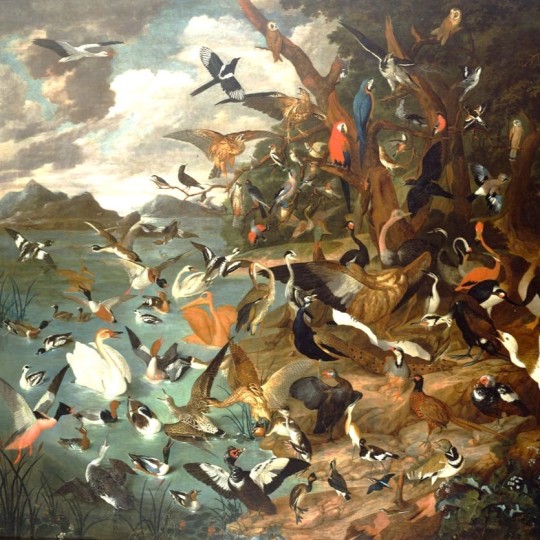
The Parliament of Birds
Painting by Carl Wilhelm de Hamilton
“How are we supposed to bring it back?” - Asimov, Complete Robot Anthology

Scene from The Conference of the Birds
Farid ud-Din Attar
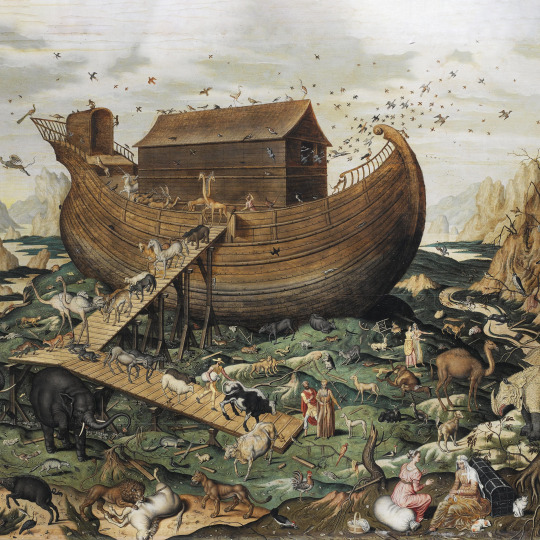
Noah’s Ark on Mount Ararat
Painting by Simon de Myle - 1570
“The old human dream of becoming a bird echoes the transition from the weighty to the volatile, from feet to wings.” - Serres, Angels A Modern Myth

A sitting of the French legislature
L'univers Illustre - 1868

Temporary installation named Conference of
the Trees - Design by Es Devlin
"Buildings that have been invaded by nature, by weeds and trees and plants that cling to their broken surfaces and nestle in gaps." - Leslie, Synthetic Worlds
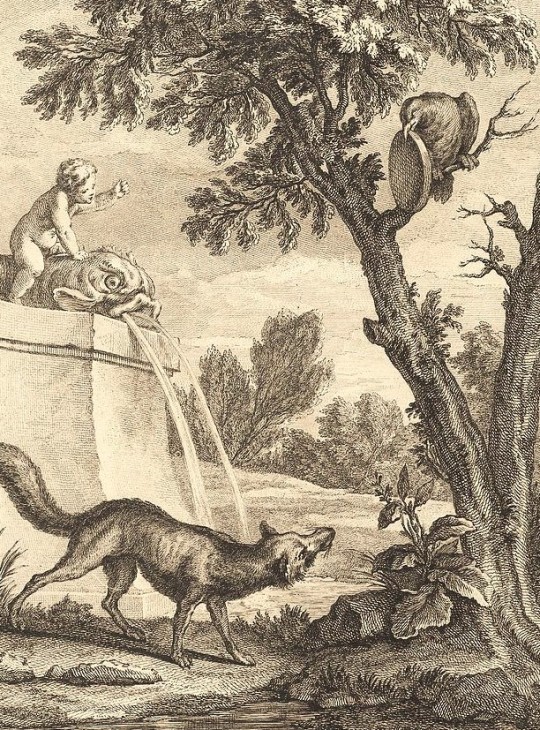
The fox and the crow
La Fontaine

Birds talking to each other
1 note
·
View note
Text
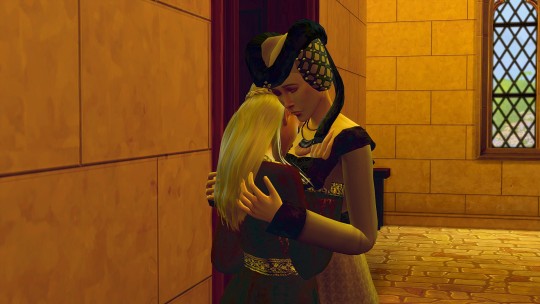
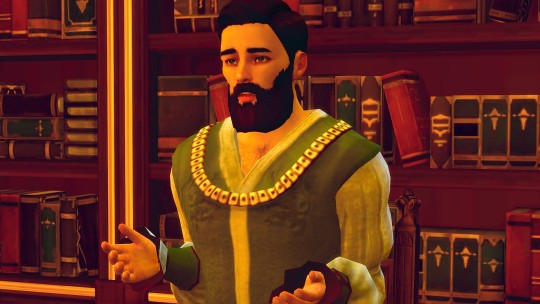

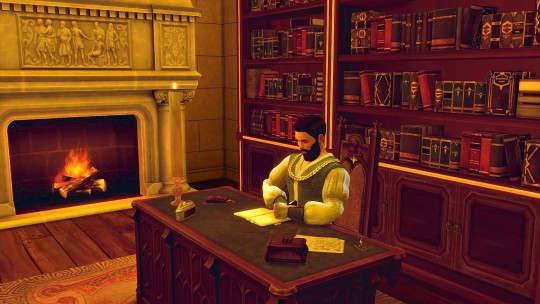

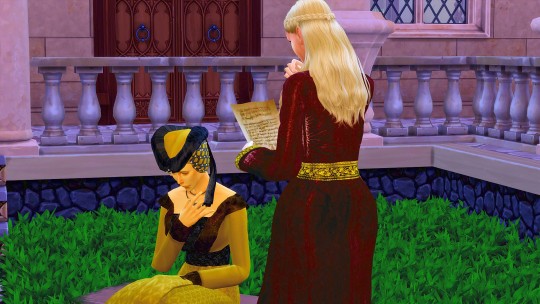

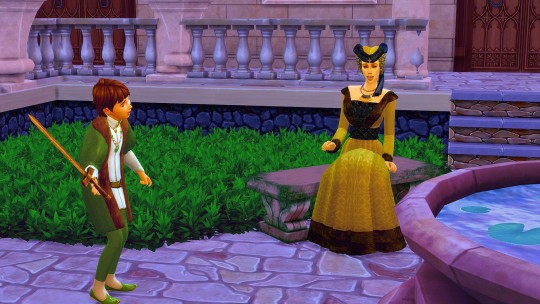

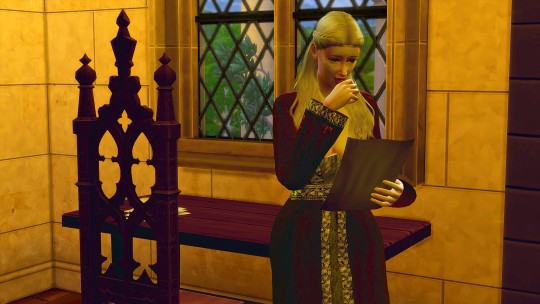
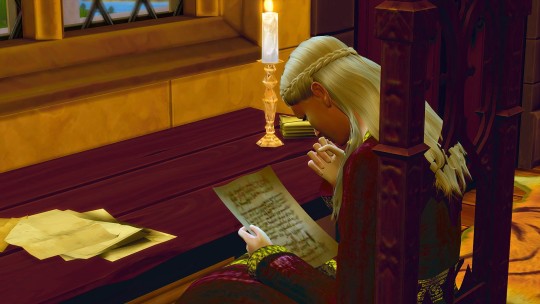
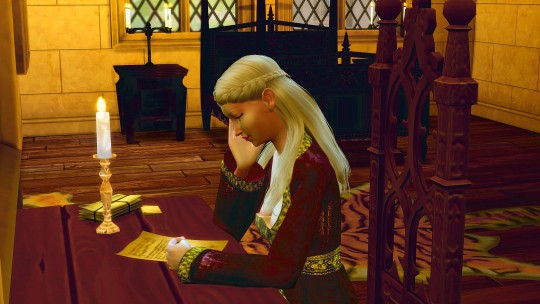

At the Castle of Amorosa, nestled within the idyllic realm of Tartosa, the dowager Queen Margaery occupied her chambers, engaged in the solemn task of perusing documents that had arrived that very morning. Among the collection, a letter bore the seal of Windenburg, and Margaery's heart quickened with a mix of apprehension and curiosity. As her eyes scanned the content penned by Lady Dorthea, Margaery's expression transformed from curiosity to sheer disbelief. The contents painted a grim tableau—a vivid account of the execution of Advorton's royal family, an unthinkable act orchestrated by none other than her own son, King Wilhelm V.
Shocked to her core, Margaery's trembling hand released the letter, letting it flutter to the floor like a leaf cast adrift by the wind. A guttural cry of agony and frustration tore from her lips, echoing the turmoil that churned within her. How could her own flesh and blood, her own son, commit such an unfathomable atrocity against his own family?
In the courtyard below, Empress Mary reveled in a precious moment of maternal respite, watching with a fond smile as her young son Fernando honed his swordsmanship skills. The peaceful scene shattered when Margaery, her countenance contorted with distress, burst through the doors with an urgency that left no room for pretense.
Margaery, her voice strained and quivering, recounted the grim tale to her daughter. The weight of the revelation bore down upon them both, a heavy burden they now shared. Empress Mary's radiant expression dimmed as the news settled upon her heart like a leaden weight. Margaery's sobs intertwined with the sorrow that enveloped them, for this was not merely the loss of a royal family, but the shattering of bonds that once held the promise of unity and shared blood.
In the hallowed chambers of Emperor Alonzo, a somber ambiance hung in the air as he busied himself with official matters of state. The sudden intrusion of his wife and mother-in-law, their faces etched with desperation and heartache, momentarily caught his attention. As Empress Mary conveyed the dire circumstances, Alonzo's gaze shifted from his work to meet hers, his own eyes reflecting a deep empathy.
Mary's plea was impassioned, a plea for aid in rescuing Princess Fiona from the clutches of her ruthless brother. But Alonzo's response was one laced with sorrowful realism. He met his wife's eyes with a mixture of regret and compassion, explaining that the window for intervention had long since closed. The impending wedding and its binding implications seemed insurmountable from their distant vantage point, a harsh reality that weighed heavily upon them all.
With a sorrowful gaze, Empress Mary withdrew from her husband's private quarters. Margaery found herself collapsing into her daughter's embrace, her heart heavy with guilt and regret. In this poignant moment, mother and daughter clung to one another, two souls united by sorrow, grappling with the harsh truth that their actions had perhaps set in motion a tragic series of events they could scarcely have foreseen.
#simsmedieval#sims4#royalsims#windenburg#royal#thesimsmedieval#sims#royalty#gameofthrones#simsstory#royal court#royalsim#royalty sims#tartosa#windenburg castle#historicalsims#history#historical sims#14th century#historical#historic#sims 4 legacy#sim legacy#ts4 legacy#legacy challenge#medieval#ancient
34 notes
·
View notes
Text
Wings of love

In a quaint village nestled deep within the heart of a dense, enchanting forest, there lived a young man named Wilhelm. He was an enigmatic figure, known for his deep connection with nature and a peculiar fascination with butterflies. The village folk often wondered at his peculiarities, for he would spend hours by the banks of a tranquil stream, watching these delicate creatures flutter about.
Wilhelm's love for butterflies knew no bounds. He marveled at their iridescent wings and graceful movements. To him, they embodied the ethereal beauty and fleeting nature of existence, a notion deeply rooted in his heart. He dreamt of becoming one with these creatures, to share in their ephemeral dance, a desire born of both longing and melancholy.
It was in this village that Wilhelm fell deeply in love with a young woman named Elise. She possessed an otherworldly grace, her laughter as melodious as a birdsong, and her smile capable of dispelling the darkest of clouds from Wilhelm's soul. Elise, too, shared a fondness for butterflies and often joined him in his contemplative reverie by the stream.
Their love blossomed, and they promised to be together forever. But fate can be a cruel mistress, and it was not long before illness stole Elise away from Wilhelm. He was devastated, his heart shattered into a thousand pieces. Yet, as he stood by her bedside, witnessing her final breath, he made a vow. He would find a way to transform into a butterfly, to be with Elise in spirit and share in the beauty that had bound them together.
In his grief-stricken solitude, Wilhelm immersed himself in the ancient, mystical texts of the forest. He sought the guidance of the wise and reclusive hermit, Adelheid, who was rumored to possess the secrets of transformation. Adelheid saw the anguish in Wilhelm's eyes and agreed to teach him the ancient art of metamorphosis.
For months, Wilhelm toiled tirelessly, learning the intricacies of the transformation ritual. He gathered rare herbs, chanted ancient incantations, and meditated under the shimmering moonlight. His body grew weak, but his determination never wavered, for he believed that the butterflies held the key to reuniting with his beloved Elise.
One fateful night, as the moon cast its silver glow upon Wilhelm, he felt a change surging through his being. His limbs grew light as air, and his vision blurred into a kaleidoscope of colors. With a flutter of wings, he transformed into a butterfly, his dream finally realized.
As a butterfly, Wilhelm soared through the forest, rejoicing in his newfound freedom. He danced in the warm summer breezes, sipped nectar from the fragrant blooms, and felt closer to Elise than ever before. But the world of butterflies was ephemeral, and time flowed differently for these delicate creatures.
Wilhelm's days as a butterfly were numbered, and as he felt his strength waning, he returned to the village. He fluttered to the spot where Elise's grave lay, landing gently on the fresh earth. In that moment, he saw her spirit, radiant and ethereal, waiting for him.
With the last of his strength, Wilhelm whispered his love for Elise, and as his wings turned to dust, he joined her in the realm of eternity, a love story that transcended life itself.
In the heart of the forest, the villagers would often speak of the butterfly that could not turn itself into a butterfly but had found a way to be with his beloved forever.
0 notes